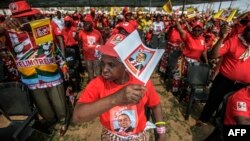Mozambique's ruling Frelimo party and its presidential candidate look likely to win elections this week despite voters' dissatisfaction with graft and inequality in one of Africa's fastest growing economies that boasts abundant energy reserves.
On Wednesday, former liberation movement Frelimo, which has dominated voting in the ex-Portuguese colony since its 1975 independence, is widely expected to win the fifth presidential ballot held since the end of a devastating 1975-1992 civil war.
More than 10 million voters will also select on Wednesday a new 250-seat parliament and members of 10 provincial assemblies.
The advantages of incumbency and his party's historic dominance have allowed Frelimo's presidential hopeful, Filipe Nyusi, 55, to run a better-resourced campaign than his main challengers, veteran Renamo opposition leader Afonso Dhlakama, and Daviz Simango, who heads the Mozambique Democratic Movement (MDM), an emergent third political force.
The winner will be well-placed to reap the early rewards of multi-billion-dollar gas and oil developments in the north of the Indian Ocean nation, which though poor is forecast by the IMF to see economic growth of more than 8 percent this year.
In lively but generally peaceful campaigning, the candidates have faced insistent demands from voters that Mozambique's plentiful resources - which besides offshore gas and oil include huge coal deposits as well as farming and fisheries potential - be used to generate more jobs and higher living standards.
“We only want the country to get better,” said Maputo resident Sara Chilundo, as she waited for a minibus taxi beside a wall plastered in red Frelimo election posters in the capital Maputo, where new malls and office blocks have sprouted skywards among the older colonial era houses and buildings.
“There has to be jobs for our children, schools,” she added.
Frelimo's stewardship under outgoing President Armando Guebuza, who is barred by the constitution from standing for a third term, has come under fire over corruption and deep divisions between rich and poor in the nation of 25.8 million.
Western donors, who have provided substantial aid for years, have also criticized the government over a lack of transparency.
'Honey' of power
In the election campaigning, Frelimo's opponents focused their attacks on what they say is the ruling party's unfair and arrogant stranglehold over political and economic power.
“Mozambique belongs to everyone” was the slogan of MDM's Simango, 50, a Renamo defector and civil engineer who made a credible first showing in the 2009 presidential vote and whose party made gains in local government elections last year.
Many Mozambicans complain that government jobs and business opportunities are reserved for card-carrying Frelimo members.
“Frelimo only governs for those who have money and those who have money don't worry about anyone else in the country,” said transport inspector and Renamo supporter Jeffrey Mucombo, 44.
Dhlakama, the former rebel chief who has lost every election to Frelimo since the end of the civil war that pitted his Renamo guerrillas against the formerly Marxist ruling party, emerged from a bush hideout in central Mozambique only last month.
He had remained holed up there for two years during which his partisans clashed with soldiers and police and ambushed traffic on a main north-south highway. A deal signed last month by Dhlakama and Guebuza reaffirmed the 1992 national peace pact.
“To vote Dhlakama is to vote stability,” the white-haired bespectacled Renamo contender, who is 61, said on Saturday when he made a surprise tour of Maputo's main neighborhoods.
Rejecting suggestions that he is an embittered warmonger, Dhlakama said that if he won he would work with all Mozambicans “as long as they are not corrupt or thieves”.
At his final rally on Sunday, which saw some of Mozambique's best-known music stars entertain several thousand supporters, Nyusi voiced Frelimo's confident message of continuity.
Promising “food in the stomach, transport, education, health, energy, water, shoes and clothes”, Nyusi said his name in the northern Makonde language meant “bee”.
“This produces the honey,” he said.
Frelimo's choice of Cabo Delgado northerner Nyusi seeks to marry its power in the south with the new energy hub being developed in the north by firms such as U.S. oil major Anadarko Petroleum Corp and Italy's Eni.
Whoever wins on Wednesday, most Mozambicans agree that political differences should be solved through the ballot box.
“When elephants fight it's the bush around that gets trampled,” said Ana Mateus, 38, a self-employed beauty care entrepreneur. “We don't want war, we want our nation to develop”.





